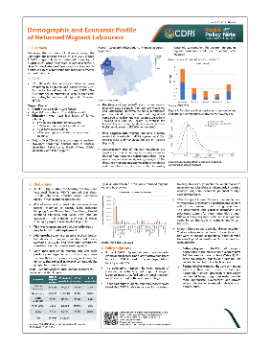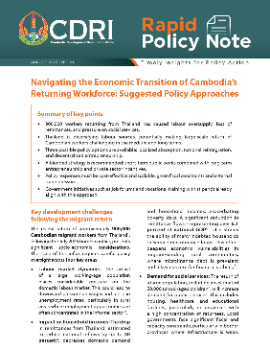
Cambodia's New Growth Strategy: An Assessment of Medium and Long-term Growth for Resilient, Inclusive, and Sustainable Development
Abstract/Summary
Cambodia’s recent economic expansion has been remarkable; however, the factors that have historically driven its growth are unlikely to sustain the same momentum in the future. The real estate boom has subsided, and the large-scale transition of labour from agriculture to manufacturing, along with the conversion of forests into farmland, can no longer fuel growth at previous rates. Additionally, external shocks—including the COVID-19 pandemic, escalating protectionism, and broader global economic disruptions—have significantly hindered the dividends of export-driven development. As a result, sustaining rapid growth in the medium term and ensuring long-term economic resilience will pose significant challenges.
Pursuing aggressive, short-term growth is neither feasible nor desirable. A rapid but unbalanced expansion could lead to heightened financial risks, environmental degradation, and increasing social inequality. Instead, the focus must shift towards ensuring the quality of development—emphasising good governance, human capital investment, social inclusion, and environmental sustainability. These elements are equally or more important than income targets, as they determine Cambodia’s ability not only to meet its medium-term goals but also to sustain long-term aspirations.
A comprehensive policy analysis of Cambodia’s economic performance across key growth determinants reveals both progress and critical gaps. Encouragingly, the country’s performance indicators have generally improved over time. However, this progress remains insufficient to bridge the gap with peer economies, thereby jeopardising the realisation of Cambodia’s economic vision. Persistent weaknesses in the business environment—particularly in regulatory quality, institutional capacity, and human development—present formidable barriers to accelerated growth.
Moreover, Cambodia’s post-pandemic recovery has been hampered by compounding challenges, including climate change, rising living costs, and other external shocks. Despite government support for vulnerable households and small enterprises, more robust and targeted policy measures are required to enhance resilience in the evolving global landscape. A paradigm shift is imperative: Prioritising the quality of growth over sheer speed will reinforce economic stability, foster inclusive prosperity, and fortify the institutions essential for sustained and higher-value growth.
This report proposes a new growth strategy to achieve high-quality and sustained economic expansion over the medium- and long-term. The strategy is twofold:
1. Sector-Specific Policies – These should capitalise on current global economic trends, including supply chain reorganisation, the green transition, and rising wealth across Asia, to drive short-to-medium-term growth. Priority sectors include agro-processing, electronics, tradeable services, and tourism. To unlock their potential, the government should focus on improving the business climate, fostering workforce development, and addressing infrastructure deficiencies to enhance competitiveness and attract foreign direct investment, thereby deepening Cambodia’s integration into global supply chains. A modern industrial policy should guide investments that diversify the economy, reducing vulnerability to external shocks.
2. Comprehensive Structural Reforms – Ensuring long-term economic resilience, inclusivity, and sustainability requires fundamental reforms. Investing in human capital, particularly in education systems that support lifelong learning, will enhance workforce adaptability to technological and economic shifts. Equally urgent are institutional reforms that strengthen regulatory frameworks, improve governance, and enhance public administration efficiency. Expanding social protection systems, increasing access to high-quality healthcare, and progressing toward universal coverage will be critical to fostering a more resilient and equitable society.
While Cambodia has already introduced numerous policies, strategies, and action plans—particularly through the Pentagonal Strategy Phase One—the key challenge lies in execution. Addressing implementation gaps requires:
- Strengthening a highly qualified public sector workforce through merit-based recruitments, promotions, and capacity building.
- Enhancing data systems to improve policy design and decision-making.
- Establishing clear prioritisation and accountability mechanisms across government agencies.
- Strengthening stakeholder engagement through effective outreach and change management strategies.
To accelerate reforms and guide Cambodia toward a more complex and dynamic economy, the government must embark on a new long-term vision for growth. This vision should articulate core values, development objectives, and policy priorities, addressing six critical areas:
- Setting realistic targets for inclusive economic growth and employment creation.
- Strengthening the role of the state in providing public services and social protection.
- Establishing a framework for environmental sustainability and transitioning to a low-carbon economy.
- Developing strategies to strengthen Cambodia’s global economic engagement in support of national development objectives.
- Advancing governance and institutional reforms to align with the requirements of an advanced economy.
- Creating mechanisms for public participation in policymaking, implementation, and oversight.
By embracing a strategy centered on high-quality, sustainable, and inclusive growth, Cambodia can navigate global uncertainties while advancing toward long-term economic prosperity. Achieving an average growth rate of 6.4 percent over the coming decade is feasible—provided that policies are effectively designed and implemented. However, growth alone is not enough. By fostering resilience, improving governance, and investing in human capital, Cambodia can ensure that prosperity is not only accelerated but also equitable and enduring.



